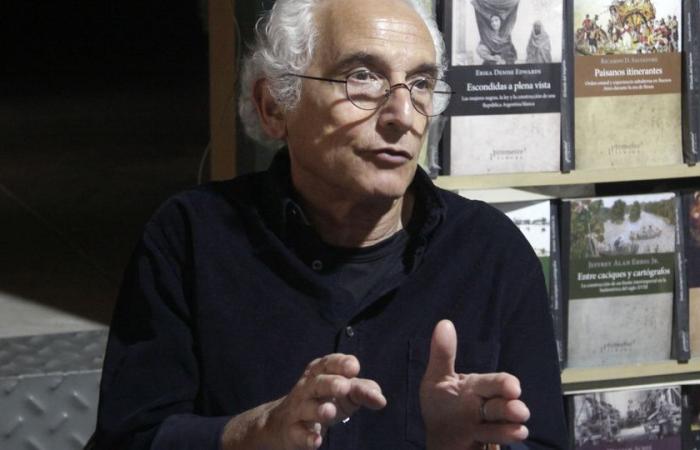
The philosopher, doctor of psychology, epistemologist and researcher in neurophysiology Miguel Benasayag –Who resides in France, a country that was exiled in 1978 – is located in Buenos Aires to present its last two books, Praise of the conflict y Mounted clinicboth co -written with their partner, Angelique Del Rey. Before the talk he will give at the Book Fair (this Friday 25 at 19 in the Cortázar Sala), he shared a meeting with a group of journalists in a new editorial space Prometheus. The talk went through diverse issues, such as an echo of the amplitude of the thinker, who has published more than 40 books. Thus the consequences for our brains of their dialogue and competence with the machines, the new psychic diseases, the government of Milei and the possibilities of resistance in a very “hard” era were some of the topics.
Benasayag, who is in the city two weeks ago, was accompanied by his daughter Amanda, 13; the editor Raúl Cariolli and his translator Darío Burzstein. The talk happened on the first floor of BAR that Prometheus opened in Pringles 521space that is also intended for talks and seminars. Before starting the conversation, the author shared this chronicler an anecdote about his Meeting with the Pope, at the beginning of February. Francisco was preparing a encyclical linked to algoritmization and childrenand had summoned the Vatican to some personalities to dialogue about it. In a meeting of just over half an hour, they talked about the difference between machines and humans. The philosopher told the Pope that it would be very difficult to say that the soul makes the difference. “That’s what we call you,” the Supreme Pontiff replied.
Is that the question for The singularity of the living – That’s right one of his most important books; Another well -known is “Do we work exist?”– Accompany Benasayag decades ago and is one of the great topics of his investigations. A question that takes special relevance in these times, in which machines compete dangerously with humans. In a certain loneliness, Benasayag has been alerting years ago on the delegation of faculties and their consequences in the brains. His last two books, however, focus on other topics.
Praise of the conflict
The back to Praise of the conflict He points out that, for some time, the complex reason has been replaced by a simple, binary, virile, warrior way to see things: the pure confrontation. “The conflict is the basis of individual and social life. They are regulations and internal self -regulations of each person, the groups, the couple, the society. It is the social fabric. The more simplify the intrapersonal and social ties, the more We eliminate the conflict and go towards the confrontation“Benasayag contrasted, to immediately connect his latest work with the current Argentina reality and the” antidemocratic “reigning power.”mercywho is a great Hayek student, It seeks to eliminate all conflict levels that create loop. It is a fantastic example of crushing the conflict. Break the fabric looking for the confrontation; That is why it is rudeness, the insult. What you are doing is break all complex, conflictive ties that form a society. So, The power and the isolated individual remain.”
The thinker, who has a past of militancy in the PRT-ERP, He drew a parallel with the time of the dictatorship. “For many years, social conflict raised during the dictatorship of Onganía, Levingston, Lanusse. There was counterculture, feminism, indigenism, the hippies. What did the Videla dictatorship do? explained.
“What is happening today in the world is that there is a crushing of conflict, complexity, and only a confrontation is being sought. Trump, Milei and Bolsonaro are the avant -garde of the transformation of the world Because, if there is no alternative, there will be no water for everyone tomorrow, food or land not flooded for everyone. They know there will be strengths surrounded by no man’s lands. The new distribution of power is that. They know that confrontation is the only thing that can allow their world model to succeed: a model where some are saved, “he expanded. He urged to” understand these mechanisms “instead of” entering the clashes “, something that produces enjoyment but does not lead to anything.
The singularity of the living
“People are desperate and rightly,” he said when referring to the advances of the artificial intelligence and the risk they imply for the working world. He was responding to the autonomous CTA. “What I worked, more than anything, in research in neurophysiology, is the weakening of brain capabilities in the delegation of functions. Now people woke up. I am not technophobic at all. My work is to see otherness. I think we can help us, knowing that they can’t replace us. And in a non -colonizing hybridization, not overwhelming like now, we can manage a democracy, social justice, “he postulated.
He also warned about two phenomena that intersect in the “weakening of the brain”: to the atrophy produced by the delegation of functions – “the released zones are recycled in a thousand years” – a “Flood unprecedented information”through screens, which paralyzes, inhibits the action.
“You have to emancipate the future”
There is a “Historical change” linked to the idea of the future. “The whole west and the colonized world lived with the idea of the future as a promise. When I started study Threatswith a lot of complexity and dark, “Benasayag synthesized. new “psychic diseases”theme that travels Mounted clinicare linked to this change, such as “anguish” that does not allow “creation of intimacy levels with oneself”, since we are in a “permanent feedback.” The author urged “Emancipit of the future”to part with the idea of a “linear time, topological as if it were a route”, typical of Western consciousness. He said that It was in jail, as a political prisoner, who learned that there is only the presentwhen he received the information that there was no possibilities of escape. “Loving the time” is, for him, an “ethical issue”. Although this is “a era of fuck.”
The philosopher has a characteristic that goes against the climate of the time: it does not remain in the darkness of the diagnosis. “Loving the time means looking for where the joy, practice, possibilities in this hard situation is. In jail I realized that freedom did not depend on being inside or outside. That had to do with developing your power, solidarity and thought in any situation. If we fail to love this time, find happy, powerful, solidarity practices, we will not be able to change anything. Resisting cannot be against only, the confrontation against what destroys you. It is, above all, to create. Create levels of conflict and possible new, “he concluded.





